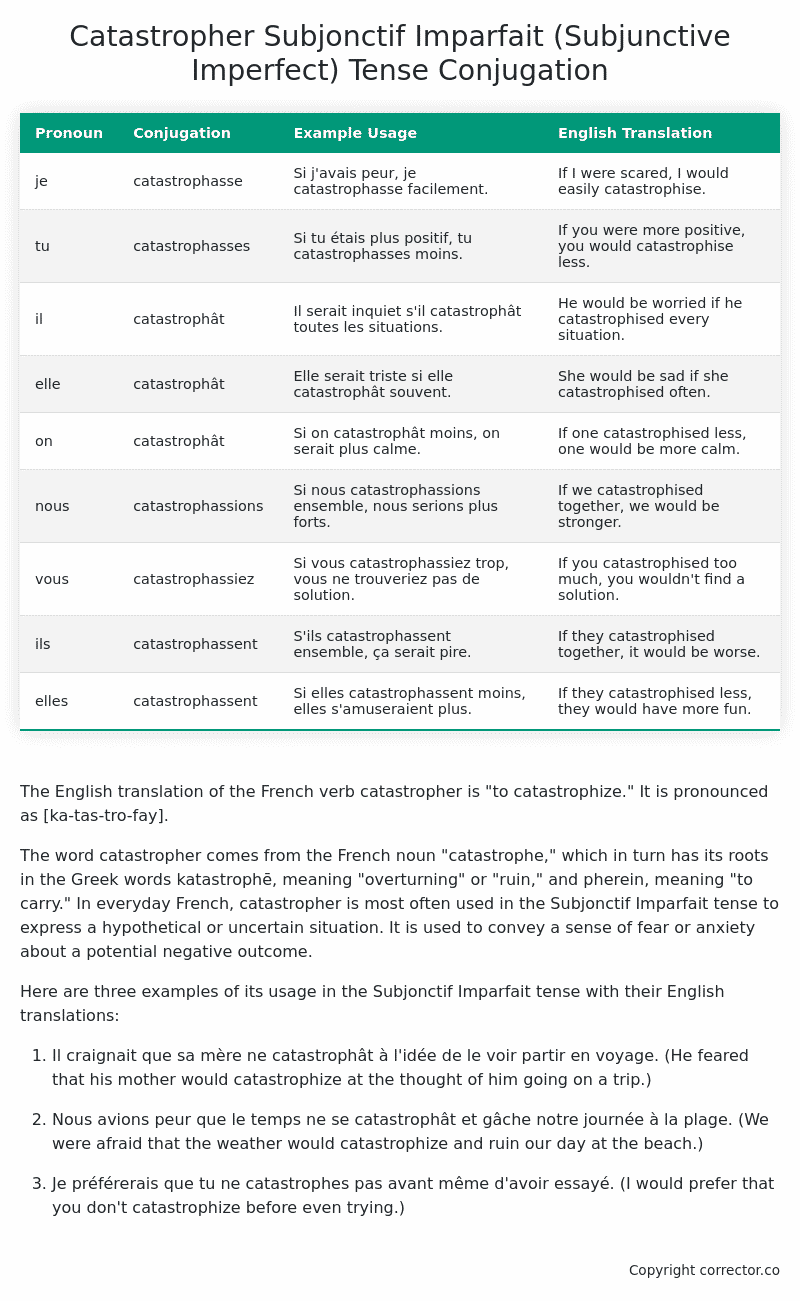Subjonctif Imparfait (Subjunctive Imperfect) Tense Conjugation of the French Verb catastropher
Introduction to the verb catastropher
The English translation of the French verb catastropher is “to catastrophize.” It is pronounced as [ka-tas-tro-fay].
The word catastropher comes from the French noun “catastrophe,” which in turn has its roots in the Greek words katastrophē, meaning “overturning” or “ruin,” and pherein, meaning “to carry.” In everyday French, catastropher is most often used in the Subjonctif Imparfait tense to express a hypothetical or uncertain situation. It is used to convey a sense of fear or anxiety about a potential negative outcome.
Here are three examples of its usage in the Subjonctif Imparfait tense with their English translations:
-
Il craignait que sa mère ne catastrophât à l’idée de le voir partir en voyage. (He feared that his mother would catastrophize at the thought of him going on a trip.)
-
Nous avions peur que le temps ne se catastrophât et gâche notre journée à la plage. (We were afraid that the weather would catastrophize and ruin our day at the beach.)
-
Je préférerais que tu ne catastrophes pas avant même d’avoir essayé. (I would prefer that you don’t catastrophize before even trying.)
Table of the Subjonctif Imparfait (Subjunctive Imperfect) Tense Conjugation of catastropher
| Pronoun | Conjugation | Example Usage | English Translation |
|---|---|---|---|
| je | catastrophasse | Si j’avais peur, je catastrophasse facilement. | If I were scared, I would easily catastrophise. |
| tu | catastrophasses | Si tu étais plus positif, tu catastrophasses moins. | If you were more positive, you would catastrophise less. |
| il | catastrophât | Il serait inquiet s’il catastrophât toutes les situations. | He would be worried if he catastrophised every situation. |
| elle | catastrophât | Elle serait triste si elle catastrophât souvent. | She would be sad if she catastrophised often. |
| on | catastrophât | Si on catastrophât moins, on serait plus calme. | If one catastrophised less, one would be more calm. |
| nous | catastrophassions | Si nous catastrophassions ensemble, nous serions plus forts. | If we catastrophised together, we would be stronger. |
| vous | catastrophassiez | Si vous catastrophassiez trop, vous ne trouveriez pas de solution. | If you catastrophised too much, you wouldn’t find a solution. |
| ils | catastrophassent | S’ils catastrophassent ensemble, ça serait pire. | If they catastrophised together, it would be worse. |
| elles | catastrophassent | Si elles catastrophassent moins, elles s’amuseraient plus. | If they catastrophised less, they would have more fun. |
Other Conjugations for Catastropher.
Le Present (Present Tense) Conjugation of the French Verb catastropher
Imparfait (Imperfect) Tense Conjugation of the French Verb catastropher
Passé Simple (Simple Past) Tense Conjugation of the French Verb catastropher
Passé Composé (Present Perfect) Tense Conjugation of the French Verb catastropher
Futur Simple (Simple Future) Tense Conjugation of the French Verb catastropher
Futur Proche (Near Future) Tense Conjugation of the French Verb catastropher
Plus-que-parfait (Pluperfect) Tense Conjugation of the French Verb catastropher
Passé Antérieur (Past Anterior) Tense Conjugation of the French Verb catastropher
Futur Antérieur (Future Anterior) Tense Conjugation of the French Verb catastropher
Subjonctif Présent (Subjunctive Present) Tense Conjugation of the French Verb catastropher
Subjonctif Passé (Subjunctive Past) Tense Conjugation of the French Verb catastropher
Subjonctif Imparfait (Subjunctive Imperfect) Tense Conjugation of the French Verb catastropher (this article)
Conditionnel Présent (Conditional Present) Tense Conjugation of the French Verb catastropher
Conditionnel Passé (Conditional Past) Tense Conjugation of the French Verb catastropher
L’impératif Présent (Imperative Present) Tense Conjugation of the French Verb catastropher
L’infinitif Présent (Infinitive Present) Tense Conjugation of the French Verb catastropher
Struggling with French verbs or the language in general? Why not use our free French Grammar Checker – no registration required!
Get a FREE Download Study Sheet of this Conjugation 🔥
Simply right click the image below, click “save image” and get your free reference for the catastropher Subjonctif Imparfait tense conjugation!

Catastropher – About the French Subjonctif Imparfait (Subjunctive Imperfect) Tense
Formation
Common Everyday Usage Patterns
Interactions with Other Tenses
Subjonctif Présent
Indicatif Passé Composé
Conditional
Conditional Perfect
Summary
I hope you enjoyed this article on the verb catastropher. Still in a learning mood? Check out another TOTALLY random French verb conjugation!


